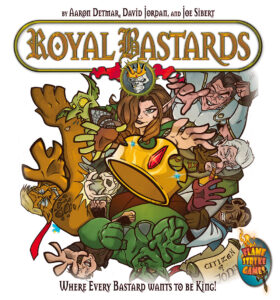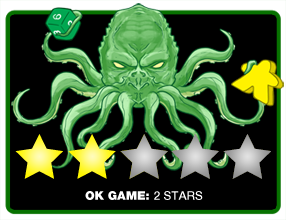 Being upfront, Royal Bastards is a game that I spent a lot of time trying to figure out what I thought of it. When reviewing games, often I get a feel for what I think right away, but this one has been different. It is political satire against a fantasy backdrop, which seemed like it would be a home run for me, but I ended up spending almost two months trying to organize my thoughts about it. Ultimately, it’s not the sort of game I might have tried on my own, but here we are!
Being upfront, Royal Bastards is a game that I spent a lot of time trying to figure out what I thought of it. When reviewing games, often I get a feel for what I think right away, but this one has been different. It is political satire against a fantasy backdrop, which seemed like it would be a home run for me, but I ended up spending almost two months trying to organize my thoughts about it. Ultimately, it’s not the sort of game I might have tried on my own, but here we are!
It is a game for 2-4 players and it plays in under an hour. The best experience is with 4 players.
Gameplay Overview:
Royal Bastards is, if nothing else, a perplexing game. The core gameplay is a form of area control and influence. It has some wrenches thrown into that with an unusual thematic layer on top. The goal is to be the player with the greatest amount of “Royal Approval” by the end of the game, gained from controlling territories each round.

Each player is one of eight “bastards” which are all parodies of contemporary political figures, such as Joe Sleepy, Barry, and Willie “the Slick” (Presidents Biden, Obama, and Clinton, respectively). Each of these has a home territory, an ability, and a number of stats. The board is modular, and is laid out with magnetic hexagons (these are certainly one of the highlights of the game, they are very slick) in an arrangement of the players’ choosing before the game.
Play occurs over eight rounds, and most of the rounds follow the same pattern: draw phase, movement phase, and contest phase. Each player completes each phase before moving onto the next. The draw phase is simply replenishing your hand with Chaos cards (more on them later), while in the movement phase, each bastard may move a number of territories based on their movement value. The contest phase represents most of the gameplay, such as it is.

During the contest phase, each territory is uncontested (only one bastard is in the territory) or contested (one or more bastards are present). In the former case, the bastard in that territory just gains a bit of influence in the territory or gold to spend, and that is it.
However, in the latter case, a contest is resolved. Contests have their own deck of cards, which have differing rewards, and most significantly are based on different attributes. As a result, you do not know entirely what to expect from them, as you could have a bastard present with a high Mastery stat, but draw a contest that uses Might or Magic. All is not lost if the contest is in an unfavorable stat, however, as there are other factors, primarily a dice roll that gets added to the relevant stat. The total for each side can also be modified through other means.
Each player has a hand of Chaos cards, which can have different effects at different times. They could increase a stat, give a negative effect to an opponent, and more. Again, makes it hard to know what to expect. Additionally, through Chaos cards and other effects in the game, players can accrue Skeletons (in their closet… penalty cards) or Endorsements (bonuses). Ultimately, whoever has the higher total wins the contest, and gets the reward, which is typically a boost of support in that territory.

Game Experience:
I’ve tried to provide as unbiased a view of the gameplay as I can, but it is probably apparent at this point that I find certain aspects of it… problematic. The biggest issue is the contests, which take up a significant portion of the rulebook and are the most time-consuming part of the game. But they just don’t happen a whole lot, at least in the early rounds and at lower player counts. The game is for 2-4 players, but the board is large enough that 2-3 players with only a single bastard each is just not enough to fill the board and lead to meaningful interaction until everyone has their second bastard.

Even then, it feels like it was really designed for 4 players (all 8 bastards on the board). If you are playing 4 players, this issue is pretty much gone the second half of the game, and it really feels like that’s the way the game should be. However, it is over too fast as there are only three normal rounds and the final festival. I appreciate that they were going for an escalation, but it is not all that interesting early on as a result. A board that grows as the game progresses, or shifting the second bastards to an earlier round might have helped.
Another issue is sometimes it feels like you lack much control of the situation. You can make plans, but there are quite a few things that can go wrong with those plans. The contests can be a completely wrong skill for you, setting you on the back foot before even rolling the dice. The dice can cause a huge swing. Rolling a 10 lets you roll another die, which can be hard to overcome. The Chaos cards can really mess with you both during and before a Contest. Everyone has at least three every round, and as the early rounds are especially limited, there’s little reason not to use them. Also, related to the Chaos cards, the Skeletons can be pretty damaging, and they are also random. They give you penalties to your stats, which somewhat compounds the issue with the contested stats being random. They could either not matter, or they could turn your great stat into nothing.

This is not to say that the game is all issues and negatives. While many things are outside your control, the gold you can accrue is helpful as a mitigator. It is easy to forget about, but there are about 10 different effects you can spend your gold on, some minor (additional move or shifting support tokens around) and some more significant (gain an Endorsement). This does make you feel you have a bit more control, but oftentimes it can be for naught. For example, the Endorsements tend to be less useful than the Skeletons are damaging. I suppose that’s pretty true-to-life, but it can be problematic from a gameplay perspective.
This leads to the game feeling like “Well, I guess its over…” at the end. It doesn’t feel bad, but it doesn’t feel like you really accomplish much. The thing that feels a little disappointing about it is, it is close enough that maybe some small changes could have made it more exciting. The changes I mentioned increasing the time with more bastards on the board are probably the biggest one, but also the contests having a bit more flexibility in terms of the attribute being contested would help. Some adjustments to make Skeletons a bit less painful (perhaps a limit on the number you can have), and the Chaos cards less intrusive, would also be improvements. Alas, however, that is not the game that was made, so it is what it is.

There are things I do like about the game, aside from the high quality components. The concept seems good, and when the contest phase works as you expect it to, it is fun. I don’t expect it to be completely under control at all times, as that would also make for a pretty boring game, but it feels like it veers too far into taking control away. It’s certainly a game that doesn’t take itself seriously, and I do appreciate the inherent humor in the cards and theme. As a result, perhaps I’m just taking it too seriously and looking for something that it was not intended to be.
Final Thoughts:
This is a game I did not know what to think of when I first looked at it. I wanted to like it and give it a fair shot. I saw some things that I liked, but ultimately, it did not click. This is a bit of a shame. I’m not huge on component quality, but the production values on this game are really good. I was shocked when I opened the box at just how nice the components are. The territory tiles are great. They’re sturdy, thick plastic, and they are magnetized. Once you have the board set up, it doesn’t get knocked apart by someone moving their minis during the game. As to the minis, they are very cool and quite detailed. This game must have been produced by John Hammond, because they spared no expense.

If you are going to play it, I do highly recommend that you play it with the full 4 players. Doing it with less is probably the biggest detriment to gameplay. Having 4 players does cause it to be even more chaotic, but if that’s something you enjoy, that is probably the point and you’d likely want more of it, rather than less. The player interaction is probably what this game would live and die by, and at the lower player counts it lacks a lot in that department, particularly in the early rounds.
This brings me to my final, and most serious complaint. If you are going to parody all 6 modern Presidents from Reagan to Biden, why not go back a little further and also include a Tricky Dick! Truly a travesty of political satire that a Nixon parody is not included in a game about royal bastards.
Final Score: 2.0 Stars – Several structural issues (lack of interaction, high degree of randomness from many angles) hold back what is a good-looking game and otherwise has strong potential.
 Hits:
Hits:
• The production values are worth the $99 price tag, and then some. Great minis.
• Yes, this falls under the first bullet point, but the magnetic map. . . I just can’t get over it!
• Plays relatively quickly, and the rules are easy to understand.
Misses:
• Lower player counts suffer from a lack of interaction. Only having 1 bastard for the first four rounds of all player counts similarly is a problem.
• Sometimes you just don’t feel like you have any control over what is going on between all the Chaos cards and random elements.
• The ways to spend Gold are helpful, but there are almost too many options for the amount you accrue in the short game time.
• There’s no Tricky Dick. COME ON.























Ooff, the art looks hideous. Like some amateurish political caricature drawing and lame rhymes/play on words for character names. And copying the ‘sleepy joe’ from Trump feels both lazy and… Republican. Is this a game with a MAGA-bias by any chance? Is there a Trump character for example (couldn’t find one in the picture)?
I wouldn’t say it is biased in that way, no. While I had many issues with the game, thankfully that was not one. He is included, btw, and it isn’t flattering either.